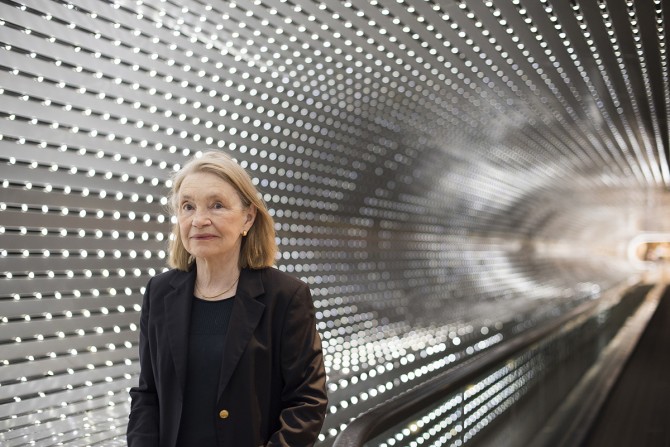Architectural historian Bonnie MacDougall dies
By Daniel Aloi
Bonnie Graham MacDougall ’62, M.A. ’65, Ph.D. ’73, professor emerita of architecture, died Nov. 26 while visiting family in Virginia. She was 76.
A graduate of the College of Arts and Sciences, MacDougall joined the architecture faculty in the College of Architecture, Art and Planning (AAP) as a visiting assistant professor in 1979 and was associate professor of architecture and Asian studies from 1988 until her retirement in 2014.
She made numerous contributions to AAP, the South Asia Program and to the study of Sri Lanka and greater South Asia.
A cultural and architectural historian with teaching experience in anthropology and linguistics, she received a Senior Fulbright Hays Award in 1979 to lecture in anthropology at the University of Sri Lanka, and another Fulbright award to conduct research there in 2012.
At Cornell, she taught graduate and undergraduate courses on architecture, culture and society, and specialized classes on the architecture of South Asia.
“Bonnie was interested in bringing an understanding of architecture to the rest of the university, having taught the Introduction to Architecture course for up to 1,000 nonmajors, and in bringing an understanding of international cultures to architecture students,” said close friend Medina Lasansky, the Michael A. McCarthy Associate Professor of Architectural Theory.
She taught a required course on the anthropology of architecture for several years. “As one student observed, it was where he first learned that buildings could be round,” Lasansky said. “According to many students, she was the best teacher they ever had. She designed several innovative courses and had ideas for many more.”
As director of the South Asia Program (1983-88) she was instrumental in the establishment of the Cornell/Syracuse University South Asia Center, a U.S. Department of Education national resource center. She was its first director from 1985-88.
Lasansky said MacDougall was “a lifelong student of the Indian subcontinent, a passion that began in high school. At the time of her death she was translating a series of rare Indian texts on vernacular building traditions. She was the consummate linguist, fluent in numerous languages. Most importantly, she was well versed in the perils of doing research – from rogue pythons to monsoon season. She had seen it all.”
With Cornell colleagues in linguistics, she helped shape the study of Sinhala, one of Sri Lanka’s official languages, resulting in a three-volume Sinhala Basic Course designed for U.S. State Department foreign service officer training.
“She had an innate ability to understand people from all walks of life,” Lasansky said. “Her observations were often pointed and on the mark, her sage counsel was appreciated by many, and she was a proud mother and grandmother.”
Her Cornell honors included an Excellence in Teaching Award and AAP Teacher of the Year in 1998, the college’s Martin Dominguez Distinguished Teaching Award in 1999 and a Faculty Innovation in Teaching Award in 2006.
Her scholarly legacy includes Beyond the Taj, a Cornell University Library digital collection launched in 2006 (also available to scholars on Artstor), produced in collaboration with Margaret Webster, director emerita of AAP’s Knight Visual Resources Facility.
Containing written work, photography, and other materials on architectural and cultural traditions in South Asia, the project draws in part from an unfinished study by MacDougall’s late husband, anthropologist and architect Robert (Scotty) MacDougall ’62, B.Arch. ’63, Ph.D. ’71, who died in 1987; as well as a joint ethnographic study by the MacDougalls and approximately 7,000 photographs, many by Robert, of architecture, rituals, pilgrimage locales and domestic life in India and Sri Lanka.
Her works on Sri Lankan architecture include “Sinhalese Domestic Life in Space and Time” (co-authored with Robert) and “Text Into Form: Dwelling, Cosmos and Design Theory in Traditional South Asia.”
“Bonnie had a vast knowledge of all things South Asian, and she was generous with her insight and encouragement for my project about India’s 18th-century astronomy observatories,” said Barry Perlus, associate professor of art. “After discovering Jai Singh’s observatories during my first trip to India, I learned that Bonnie had researched Jai Singh extensively, and we had numerous talks about the Jantar Mantar, as his observatories are commonly known.”
Survivors include daughters Margaret ’96 and Carlin ’94, B.Arch. ’99, M.Arch. ’00. A memorial service will be held Dec. 16 at 11 a.m. at the First Congregational Church in Ithaca. In lieu of flowers, donations may be made to the Robert D. and Bonnie G. MacDougall Memorial Scholarship Fund.
AAP design and communications assistant Edith Fikes contributed to this article.
Media Contact
Get Cornell news delivered right to your inbox.
Subscribe